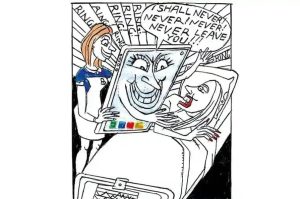In the fall of 2018, 31-year-old Lee Carter – a member of Virginia’s House of Delegates and a self-described socialist – took to Twitter to expose just about all the proverbial skeletons in his closet. His rationale: he wanted to air it before it showed up in opposition research.
Some of it, such as his custody battle over his kid and an arrest for assault at Marine boot camp that was ‘quickly ruled self defense’ was the sort of thing that could have been used against any politician going back for generations. But other admissions were very specific to his having grown up in a world where everything is digitized – possibly permanently.
Carter admitted to having said ‘homophobic, transphobic, sometimes sexist or racially insensitive’ things on the early internet as a teenager, and that ‘just like everyone else under 35, I’m sure explicit images or video of me exists out there somewhere.’
I’m about Carter’s age, and when my peers and I were in our 20s we sometimes speculated that by the time our generation started running for office, there would be a more relaxed attitude toward ‘youthful indiscretions’ (to use a term popularized by former President George W. Bush), because many of us have lived our whole lives online. Everyone’s flawed, and everyone makes mistakes, after all. Would we become more forgiving?
So far, no.
The digital daggers just got sharper and quicker – whether the target is a political candidate or a journalist who’s just landed a plush new gig. It’s not just the extreme partisanship of our age. It’s that so many digital natives have been inoculated to the idea that it’s OK to be cruel on the internet as long as you feel that you’re righteous. (This is a problem that badly poisons many online social justice communities, but that’s a another column.)
Millennials on both sides of the ideological aisle are horrified when politicians of an older generation, such as Virginia governor Ralph Northam, admit to having worn blackface in their younger years. The political left were quick to condemn Northam, who is a Democrat. But that’s in part because blackface has been considered unacceptable by the US mainstream for decades, and that these days anyone partaking in it knows full well that it’s wildly offensive. There are few excuses to be made for it.
The problem poses itself in the situations that are less obvious. It’s tougher to disqualify an example of a genuine youthful indiscretion – say, a millennial political candidate who had been an angry teenage atheist and made disparaging remarks about religious people in online forums. The same goes with behaviors that were less unacceptable in the recent past than they are now, as many forms of casual homophobia were just a decade or two ago. (Like Lee Carter, I’m now shocked at some of the things that got a pass on the internet of yore.) In the face of uncertainty, what we tend to do in these gray areas is excuse when the offender is aligned with us ideologically and condemn when he or she isn’t. Worse, we feel real outrage when the sinner isn’t on our team. Internet guilt is obscenely subjective.
But applying purity tests only to our ideological opponents isn’t just hypocritical. It involves the assumption that those we agree with are somehow more honest. Sure, we’ll believe our guy when he says he regrets making sexist remarks in his college’s satire magazine, but the other guy can’t possibly be sincere. This logical misstep only serves to further hyperpartisanship and mistrust of those with whom we disagree – even beyond the ones we elect.
Besides, if this continues, it may soon become the norm for digital natives running for office or about to take on prominent public roles to feel the need to publish a rap sheet of past faults and stumbles before anyone else can jump in and ruin them. That is authoritarian and creepy.


















